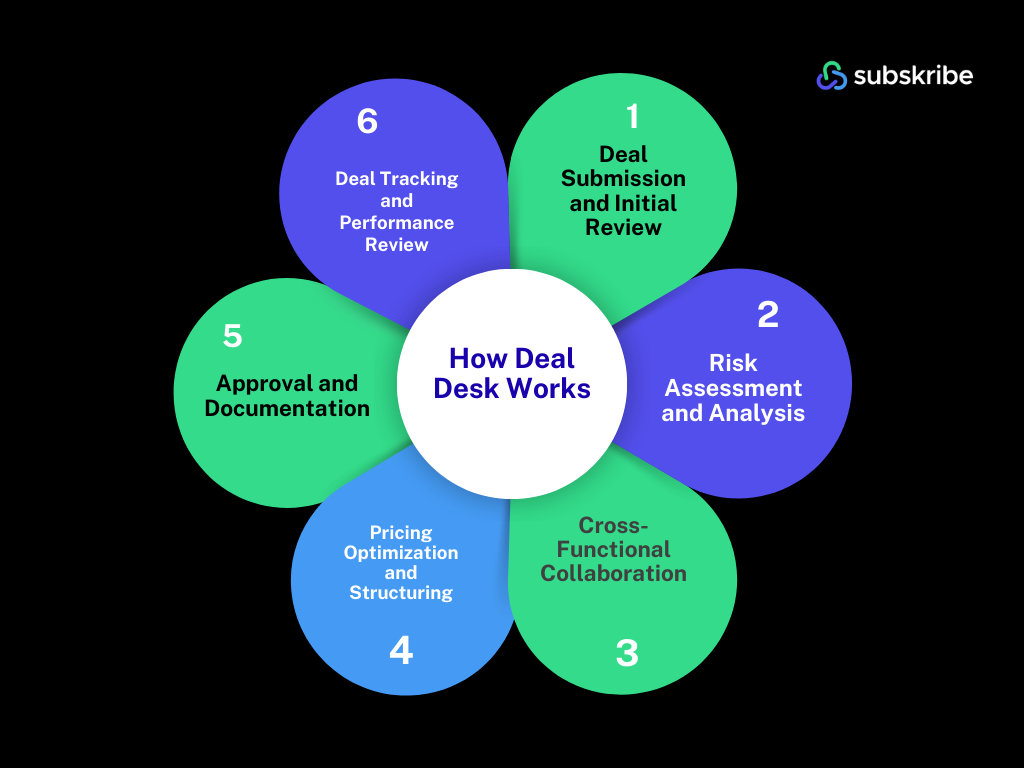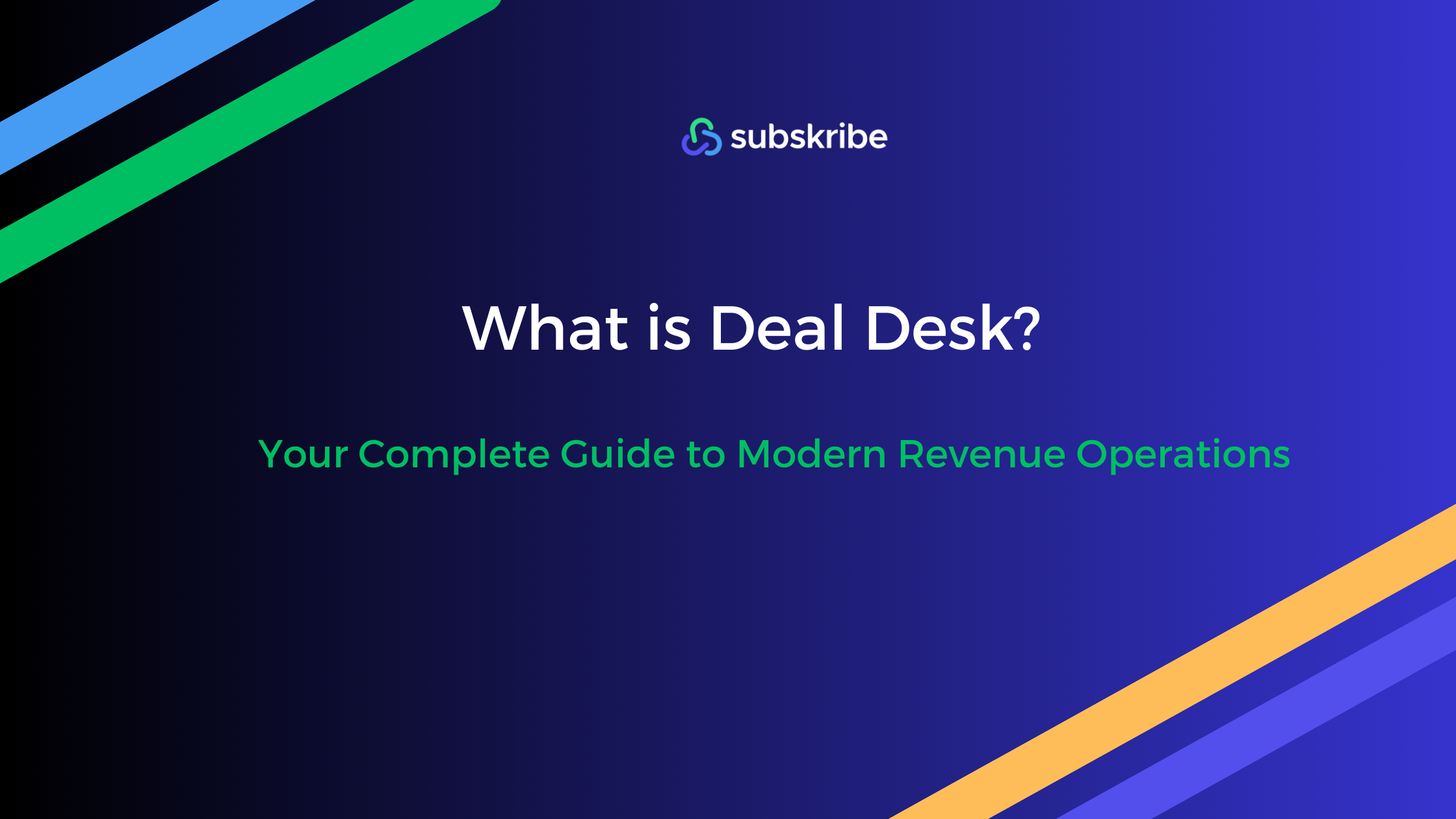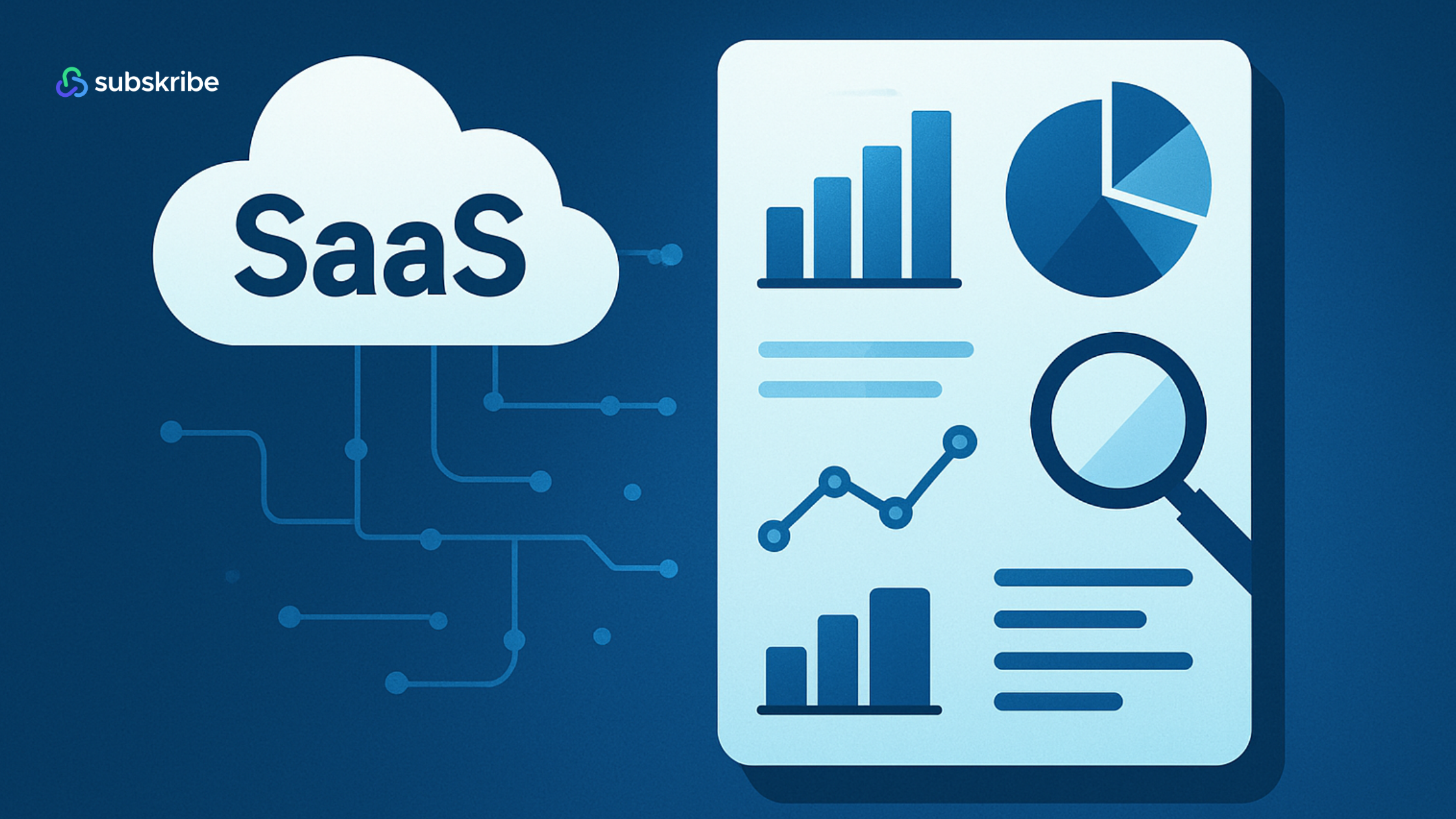What is Deal Desk?
A Deal Desk is your organization's strategic command center for managing complex sales transactions and pricing decisions. Your Deal Desk serves as the central hub where sales, finance, legal, and operations teams collaborate to structure, price, and approve deals efficiently.
Key Functions of Your Deal Desk:
- Deal Review and Approval: Your Deal Desk evaluates complex pricing scenarios and non-standard contract terms before approval
- Cross-functional Collaboration: Your Deal Desk brings together multiple departments to ensure deal consistency
- Risk Management: Your Deal Desk protects your organization from unfavorable terms and pricing errors
- Process Standardization: Your Deal Desk maintains uniform deal approval workflows across your sales organization
Teams Involved in Your Deal Desk:
- Sales Teams: Collaborate with your Deal Desk to structure competitive proposals and navigate complex pricing requirements
- Finance Teams: Work with your Deal Desk to ensure deal profitability and accurate revenue recognition
- Legal Teams: Partner with your Deal Desk to review contract terms and mitigate compliance risks
- Operations Teams: Support your Deal Desk with data analysis and process optimization
When your sales team encounters complex pricing scenarios, high-value opportunities, or unique customer requirements, your Deal Desk steps in to provide expert guidance. Your Deal Desk doesn't just approve or reject deals – it optimizes them for maximum value while ensuring compliance with your company's policies.
The modern Deal Desk has evolved into a strategic revenue optimization center that uses data analytics and market intelligence to drive better outcomes. Your Deal Desk team becomes the guardian of your pricing strategy, ensuring every deal aligns with your organization's profitability goals and growth objectives.

The Evolving Role of Deal Desk
Your Deal Desk has undergone a remarkable transformation over the past decade, evolving from a simple approval gateway to a sophisticated revenue optimization engine. Understanding this evolution helps you appreciate the strategic value your Deal Desk brings to your organization today.
From Manual Approvals to Strategic Intelligence
Initially, your Deal Desk operated as a basic approval checkpoint. Sales teams would submit deals for review, and your Deal Desk would either approve or reject them based on standard pricing guidelines. This reactive approach focused primarily on risk mitigation rather than revenue optimization.
As businesses grew more complex, your Deal Desk evolved into a proactive partner for sales teams. Your Deal Desk began analyzing deal patterns, identifying revenue opportunities, and providing strategic guidance on deal structuring. This shift transformed your Deal Desk from a gatekeeping function into a value-creation center.
The AI Revolution in Deal Management
Today's Deal Desk leverages artificial intelligence to make faster, smarter decisions. Deal Desk AI analyzes historical deal data, market trends, and customer behavior to provide real-time recommendations for pricing and terms. Your Deal Desk AI capabilities enable predictive analytics, automated approval workflows, and intelligent deal scoring.
Modern Deal Desk AI can process thousands of deal variables simultaneously, helping your Deal Desk team identify optimal pricing strategies and potential risks instantly. This technological advancement allows your Deal Desk to scale operations while maintaining accuracy and consistency across all deal approvals.
Why Do I Need a Deal Desk?
Your business needs a Deal Desk when deal complexity starts outpacing your sales team's ability to manage pricing and approvals efficiently. If you're asking yourself whether you need a Deal Desk, chances are you're already experiencing the pain points that make a Deal Desk essential for sustainable growth.
Key Factors to Consider for Your B2B SaaS Business:
1. Deal Size and Complexity: Your Deal Desk becomes essential when enterprise deals involve multi-year contracts, complex pricing tiers, or custom terms that require specialized expertise
2. Sales Team Growth: You need a Deal Desk when your expanding sales team struggles to maintain pricing consistency and deal quality across different territories
3. Approval Bottlenecks: Your Deal Desk is crucial if deals regularly stall in approval processes, creating friction in your sales cycles and customer experience
4. Revenue Scale: Consider implementing your Deal Desk when protecting profit margins becomes critical for sustainable growth and investor confidence
Warning Signs You Need a Deal Desk Now:
- Inconsistent Pricing: Different sales reps quote varying prices for similar deals, eroding your profit margins
- Delayed Deal Closure: Sales cycles are extending because reps can't get timely approvals for non-standard terms
- Executive Overwhelm: Senior leadership spends excessive time approving routine deals instead of strategic activities
- Compliance Risks: Legal and finance teams struggle to review every contract before signing
Your Deal Desk becomes the solution that transforms these pain points into competitive advantages, ensuring your B2B SaaS business scales efficiently while maintaining profitability and compliance standards.
Process of Deal Desk: How Deal Desk Works
Understanding how your Deal Desk operates helps you appreciate the systematic approach behind successful deal management. Your Deal Desk follows a structured workflow that ensures every opportunity receives proper evaluation while maintaining deal velocity. This standardized process enables your Deal Desk to handle increasing deal volumes without sacrificing quality or accuracy.

Step 1: Deal Submission and Initial Review
Your sales rep submits the deal to your Deal Desk through a standardized intake process with all relevant details, including customer information, pricing requirements, special terms, and competitive landscape. Your Deal Desk team conducts an initial review to determine the complexity level, urgency, and required approval path. During this phase, your Deal Desk identifies any missing information and requests clarification from the sales team to ensure complete deal evaluation.
Step 2: Risk Assessment and Analysis
Your Deal Desk analyzes the deal against established guidelines, evaluating pricing margins, contract terms, customer credit risk, and potential legal implications. This comprehensive assessment helps your Deal Desk determine whether the deal requires standard approval or escalation to senior stakeholders. Your Deal Desk also reviews historical data from similar deals to identify patterns and benchmark performance expectations.
Step 3: Cross-Functional Collaboration
Your Deal Desk coordinates with finance, legal, operations, and product teams to address specific deal requirements and ensure alignment with company policies. This collaborative approach ensures your Deal Desk considers all business implications before making recommendations. Your Deal Desk facilitates communication between departments to resolve any conflicts or concerns that might impact deal approval.
Step 4: Pricing Optimization and Structuring
Your Deal Desk reviews pricing models, discount structures, payment terms, and contract duration to optimize deal value while maintaining competitiveness. The team may suggest alternative pricing approaches, bundling options, or payment schedules that better align with your company's strategic objectives and cash flow requirements. Your Deal Desk ensures pricing decisions support long-term customer relationships and sustainable revenue growth.
Step 5: Approval and Documentation
Once analysis is complete, your Deal Desk provides clear approval decisions along with detailed rationale and any conditions or modifications required. Approved deals receive proper documentation, including approval workflows and communication templates for the sales team to present to customers. Your Deal Desk maintains comprehensive records for audit purposes and future reference.
Step 6: Deal Tracking and Performance Review
Your Deal Desk monitors approved deals through closure, tracking key metrics like conversion rates, deal velocity, and margin realization. This ongoing analysis helps your Deal Desk identify successful patterns and areas for improvement, refining approval criteria and enhancing future deal evaluations for better organizational learning.
This systematic approach ensures your Deal Desk maintains consistency while adapting to unique deal requirements, ultimately driving better revenue outcomes and operational efficiency for your organization.
Who Owns and Runs the Deal Desk
The ownership and management of your Deal Desk varies significantly across organizations, depending on company size, structure, and strategic priorities. Understanding who should own your Deal Desk helps you establish clear accountability and ensure proper integration with your broader business operations.
Common Organizational Models for Deal Desk Ownership:
- Sales Operations Leadership: Your Deal Desk operates as an extension of the sales team, maintaining close alignment with revenue generation goals and field requirements
- Revenue Operations (RevOps): Your Deal Desk coordinates across sales, marketing, and customer success functions for broader customer lifecycle visibility
- Finance Team Oversight: Your Deal Desk emphasizes margin protection and risk management with strict financial discipline in deal approvals
- Dedicated Deal Desk Unit: Some organizations create standalone Deal Desk teams that report directly to executive leadership for maximum cross-functional authority
Key Personnel Who Run Your Deal Desk:
- Deal Desk Manager: Leads your Deal Desk operations and serves as the primary liaison between sales teams and executive leadership
- Deal Desk Analysts: Specialized professionals who evaluate pricing, contract terms, and deal structures for your Deal Desk operations
- Cross-Functional Representatives: Legal, finance, and product team members who contribute specialized expertise to your Deal Desk decisions
- Operations Specialists: Technical experts who manage Deal Desk systems, workflows, and performance analytics
The success of your Deal Desk depends on having the right organizational placement and skilled personnel who can balance deal velocity with business protection. Your Deal Desk leadership must ensure seamless coordination between all stakeholders while maintaining decision-making efficiency.
Roles & Responsibilities of a Deal Desk Analyst
Your Deal Desk analyst serves as the backbone of your Deal Desk operations, combining analytical expertise with business acumen to evaluate and optimize every deal. Understanding these responsibilities helps you appreciate the strategic value your Deal Desk analyst brings to your revenue operations.
Core Analytical Responsibilities:
- Deal Evaluation and Review: Your Deal Desk analyst examines every submitted deal for pricing accuracy, margin calculations, and compliance with company guidelines
- Risk Assessment: Your Deal Desk analyst identifies potential financial, legal, and operational risks associated with proposed deal terms and structures
- Competitive Analysis: Your Deal Desk analyst researches market conditions and competitor pricing to ensure your deals remain competitive while protecting margins
- Data Analysis and Reporting: Your Deal Desk analyst tracks deal performance metrics and provides insights to improve future Deal Desk processes
Strategic and Operational Duties:
- Cross-Functional Collaboration: Your Deal Desk analyst coordinates with sales, finance, legal, and operations teams to gather necessary approvals and information
- Deal Structuring and Optimization: Your Deal Desk analyst recommends alternative pricing models, payment terms, and contract structures to maximize deal value
- Process Improvement: Your Deal Desk analyst identifies bottlenecks in the Deal Desk workflow and suggests improvements to increase efficiency
- Training and Support: Your Deal Desk analyst educates sales teams on pricing guidelines, approval processes, and Deal Desk requirements
- Documentation and Compliance: Your Deal Desk analyst maintains detailed records of all Deal Desk decisions and ensures adherence to regulatory requirements
Your Deal Desk analyst's expertise directly impacts your organization's ability to close deals quickly while maintaining profitability and minimizing risk exposure.
What Can Deal Desk Help With?
Your Deal Desk serves as a multifaceted solution center that addresses critical business challenges across your entire revenue operation. Understanding these capabilities helps you maximize the value your Deal Desk brings to your organization's growth strategy.
Quote Generation and Optimization
Deal Desk provides expert guidance on complex quotations, ensuring accurate pricing calculations and proper product configurations. Your Deal Desk team helps sales reps create professional, compliant quotes that reflect current pricing strategies while addressing unique customer requirements and maintaining competitive positioning in the market.
Ramp Deals
Deal Desk specializes in structuring graduated pricing arrangements that align with customer growth trajectories and budget constraints. Your Deal Desk expertise in ramp deals enables your sales team to close larger, long-term contracts by offering flexible payment structures that scale with customer usage and business expansion.
Contract Lifecycle Management
Deal Desk optimizes renewal opportunities by analyzing historical performance data and market conditions to recommend optimal pricing and terms. Your Deal Desk team ensures renewal contracts maximize customer lifetime value while maintaining competitive retention rates and identifying upselling opportunities within existing accounts.
Cross-Functional Alignment and Communication
Your Deal Desk serves as the central coordination hub between sales, finance, legal, and operations teams. This alignment ensures all stakeholders understand deal implications and work collaboratively toward successful outcomes, reducing internal conflicts and improving overall deal quality through streamlined communication channels.
Revenue Forecasting and Analytics
Your Deal Desk provides critical data insights that improve revenue predictability and strategic planning. Your Deal Desk team tracks deal patterns, conversion rates, and pricing trends to help leadership make informed decisions about market positioning, resource allocation, and future growth strategies.
Benefits of Implementing Deal Desk
Your Deal Desk implementation delivers measurable improvements across multiple business dimensions, transforming how your organization approaches revenue generation and deal management. These benefits compound over time, creating sustainable competitive advantages for your business.
Faster Sales Cycles
Your Deal Desk streamlines approval processes and eliminates decision-making bottlenecks that traditionally slow down sales cycles. By establishing clear approval criteria and standardized workflows, your Deal Desk enables sales teams to move deals through the pipeline faster. Sales reps spend less time waiting for approvals and more time engaging with prospects, resulting in shorter sales cycles and improved revenue velocity.
Higher Profit Margins
Your Deal Desk protects and optimizes profit margins by implementing consistent pricing discipline across your sales organization. The centralized approach prevents unauthorized discounting while ensuring competitive pricing strategies align with market conditions. Your Deal Desk team analyzes each deal's profitability impact, leading to better margin preservation and sustainable revenue growth that directly impacts your bottom line.
Improved Deal Quality
Your Deal Desk expertise in deal structuring and risk assessment results in higher-quality proposals that better meet customer needs. This strategic approach to deal construction increases your win rates while ensuring customer success from day one. Your Deal Desk creates win-win scenarios that build stronger customer relationships and reduce post-sale complications.
Scalable Growth Operations
Your Deal Desk framework scales efficiently with your business expansion, handling increased deal volume without proportional increases in operational overhead. As your sales team grows and deals become more complex, your Deal Desk processes adapt to maintain consistency and control. This scalability enables sustainable growth without sacrificing deal quality or approval speed.
Data-Driven Strategic Insights
Your Deal Desk generates valuable insights through comprehensive deal tracking and performance analysis. This data enables leadership to make informed strategic decisions about pricing strategies, market positioning, and resource allocation. Your Deal Desk analytics help identify successful deal patterns and optimize future revenue opportunities.
How Deal Desk Impacts Sales, Finance, and RevOps Teams
Your Deal Desk creates transformative impacts across critical business functions, enhancing performance and collaboration between teams. Understanding these specific impacts helps you appreciate how your Deal Desk drives organizational success through improved cross-functional efficiency.
Sales Team Impact
- Faster Deal Approval and Closure
- Enhanced Pricing Confidence and Authority
- Reduced Administrative Burden and Complexity
Finance Team Impact
- Better Margin Protection and Control
- Accurate Revenue Recognition and Forecasting
- Risk Mitigation and Compliance Assurance
RevOps Team Impact
- Enhanced Cross-Functional Coordination and Alignment
- Improved Data Quality and Analytics
- Strategic Revenue Optimization and Planning
Common Challenges Faced by Deal Desk
Your Deal Desk encounters various operational and strategic challenges that can impact its effectiveness and organizational value. Understanding these common obstacles helps you prepare solutions and optimize your Deal Desk performance for sustainable success.
Balancing Speed with Accuracy
Your Deal Desk faces constant pressure to approve deals quickly while maintaining thorough evaluation processes. Sales teams demand rapid turnaround times to meet customer expectations and close deals faster, but rushing through complex deal analysis can lead to costly mistakes. Your Deal Desk must develop efficient workflows that deliver both speed and precision without compromising deal quality or organizational risk management.
Managing Cross-Functional Stakeholder Expectations
Your Deal Desk operates at the intersection of multiple departments with competing priorities and timelines. Sales teams want maximum flexibility and fastest approvals, finance demands strict margin protection, and legal requires comprehensive risk assessment. Your Deal Desk must navigate these conflicting expectations while maintaining productive relationships across all stakeholder groups and ensuring fair representation of each department's concerns.
Scaling Operations with Business Growth
Your Deal Desk struggles to maintain consistent performance as deal volumes increase and complexity grows with business expansion. Limited resources and personnel often create bottlenecks during peak sales periods, while varying deal types require specialized expertise that may not be readily available. Your Deal Desk must develop scalable processes and potentially invest in automation technologies to handle growth efficiently.
Best Practices to Optimize Deal Desk for Revenue Growth
Deal Desk optimization requires strategic implementation of proven practices that enhance both efficiency and revenue impact. These best practices transform your Deal Desk from a basic approval function into a revenue acceleration engine that drives sustainable business growth.
1. Create Standard Processes
Your Deal Desk should establish clear, documented approval criteria and decision trees that eliminate ambiguity in the review process. Standardized workflows enable faster decision-making while ensuring consistent application of pricing policies across all deals. Your Deal Desk team can focus on complex exceptions rather than routine approvals, improving overall efficiency.
2. Use Data for Pricing
Your Deal Desk must utilize historical deal data and market intelligence to make informed pricing recommendations. Analytics help your Deal Desk identify successful deal patterns, optimal discount thresholds, and competitive positioning strategies that maximize revenue while maintaining win rates and customer satisfaction.
3. Build Team Collaboration
Maintain strong relationships with sales, finance, and legal teams through regular communication and shared objectives. Collaborative approaches ensure your Deal Desk decisions align with broader business goals while building trust and support across departments.
4. Automate Routine Tasks
Deal Desk can significantly improve efficiency by automating repetitive tasks like data entry, basic approvals, and notification workflows. Automation allows your Deal Desk team to concentrate on strategic deal optimization and complex problem-solving activities that require human expertise.
5. Track Performance Regularly
You must track key performance indicators, including approval times, deal velocity, margin protection, and team productivity. Regular performance monitoring enables your Deal Desk to identify improvement opportunities and demonstrate value to organizational leadership through measurable results.
Metrics to Measure Deal Desk Performance
Your Deal Desk performance measurement requires tracking specific metrics that demonstrate business impact and operational efficiency. These key metrics help you evaluate your Deal Desk effectiveness and identify areas for continuous improvement.
Essential Deal Desk Performance Metrics:
- Sales Velocity: Measure how quickly your Deal Desk processes deals and reduces sales cycle length from initial submission to final closure. Faster sales velocity indicates that your Deal Desk streamlines approval workflows and eliminates bottlenecks that traditionally slow down revenue generation across your sales organization.
- Financial Performance: Track profit margins, revenue recognition accuracy, and discount control managed through your Deal Desk operations. Strong financial performance demonstrates that your Deal Desk balances competitive pricing with profitability requirements while protecting company margins and supporting sustainable business growth.
- Deal Win Rate: Monitor the percentage of deals your Deal Desk approves that successfully close with customers. Higher win rates show that your Deal Desk pricing and structuring decisions align with market demands and customer expectations while maintaining competitive positioning in your industry.
- Stakeholder Satisfaction: Survey sales reps and customers to evaluate their satisfaction with your Deal Desk support, responsiveness, and decision quality. Positive stakeholder feedback indicates that your Deal Desk delivers value to internal teams and maintains positive customer relationships throughout the deal approval process.
Stop Losing Revenue to Deal Complexity
Your Deal Desk represents a critical investment in scalable revenue growth and operational efficiency. The strategic implementation of Deal Desk processes transforms your sales organization from reactive deal management to proactive revenue optimization that drives sustainable business success.
Don't let complex deals slow down your sales velocity or compromise your profit margins. Your organization deserves a Deal Desk solution that streamlines approvals, protects profitability, and accelerates revenue growth through intelligent automation and expert guidance.
Ready to revolutionize your Deal Desk operations? Subskribe's Deal Desk AI solution combines AI-powered analytics with streamlined workflows to optimize your deal management process. Our platform empowers your teams with faster approvals, better pricing decisions, and enhanced cross-functional collaboration.
Schedule a demo with Subskribe to discover how our Deal Desk technology can transform your revenue operations and drive measurable business growth for your organization.
Frequently Asked Questions
1. Where does a Deal Desk sit in an organization?
Your Deal Desk typically sits within Sales Operations, Revenue Operations, or Finance departments depending on your organizational structure and strategic priorities. Most companies place their Deal Desk under Revenue Operations for cross-functional coordination, while others position it within Sales Operations for closer sales alignment. Some organizations place their Deal Desk under Finance leadership when margin protection and risk management are primary concerns. The key is ensuring your Deal Desk has appropriate authority and access to all stakeholders.
2. What is a deal desk analyst?
A Deal Desk analyst is a specialized professional who evaluates, structures, and optimizes complex sales deals. Your Deal Desk analyst combines analytical skills with business expertise to review pricing, assess risks, and coordinate cross-functional approvals. They serve as the primary point of contact between sales teams and your Deal Desk operations.
3. Why does my business need a deal desk?
Your business needs a Deal Desk when deal complexity outpaces your sales team's ability to manage pricing and approvals efficiently. A Deal Desk becomes essential for maintaining pricing consistency, protecting profit margins, and accelerating deal velocity as your organization scales and encounters more complex enterprise deals.
How does Deal Desk help sales teams in closing deals?
- Faster Approvals: Your Deal Desk streamlines approval workflows and eliminates bottlenecks
- Pricing Confidence: Your Deal Desk provides data-driven pricing recommendations and competitive insights
- Expert Support: Your Deal Desk handles complex contract negotiations and risk assessment
- Administrative Relief: Your Deal Desk manages paperwork and cross-functional coordination
4. Who runs the deal desk?
Your Deal Desk is typically managed by experienced professionals with backgrounds in sales operations, finance, or business analysis. Deal Desk leadership requires expertise in pricing strategy, contract negotiation, and cross-functional coordination to balance speed with accuracy while supporting revenue growth objectives.
5. How does Subskribe CPQ help with its Deal Desk AI?
Subskribe's Deal Desk AI revolutionizes your deal management process through intelligent automation and advanced analytics. Our AI-powered platform analyzes historical deal data, market trends, and customer behavior to provide real-time pricing recommendations and risk assessments. The system automates routine approvals while flagging complex deals that require human expertise. Subskribe's Deal Desk AI integrates seamlessly with your existing workflows, providing sales teams with instant access to pricing guidance, competitive intelligence, and approval status updates. This intelligent approach reduces deal cycle times, improves pricing accuracy, and enables your Deal Desk team to focus on strategic optimization rather than administrative tasks.
6. Are Deal Desk same as revenue operations?
No, your Deal Desk is a specific function within revenue operations. While Revenue Operations encompasses the entire revenue process, including marketing, sales, and customer success alignment, your Deal Desk focuses specifically on deal evaluation and approval processes.
.png)














